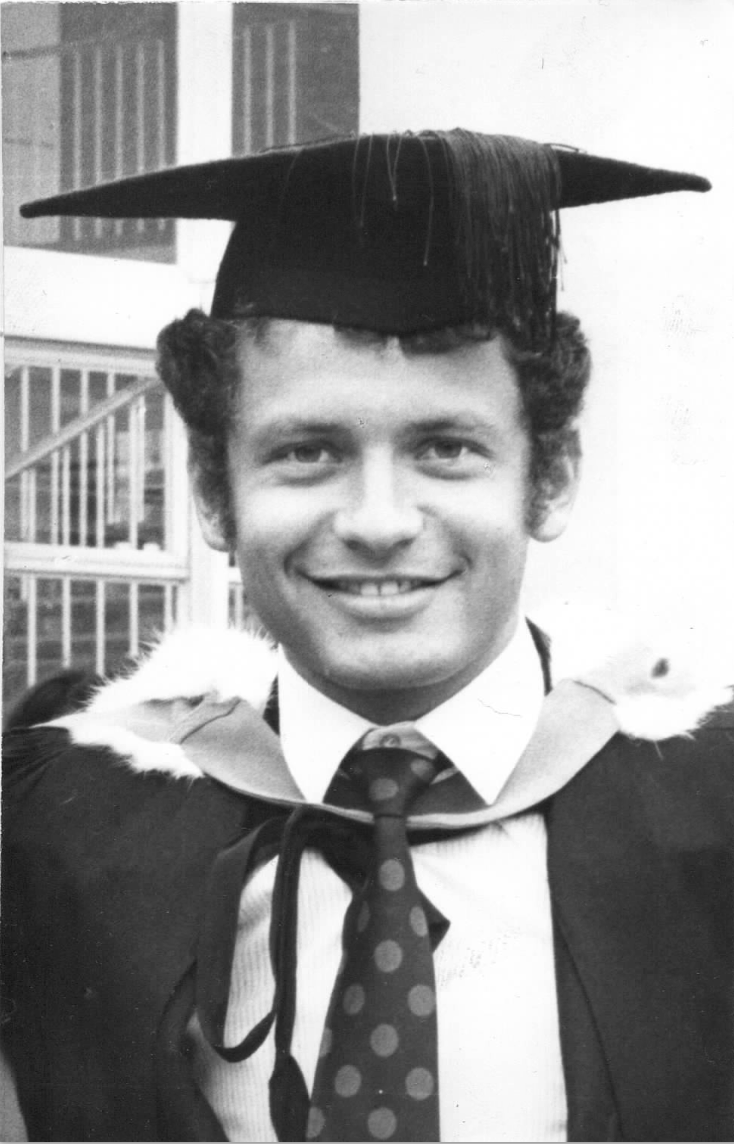We need a more diverse range of accents on Australian television

When Australia’s national broadcaster first offered me the opportunity to go to air as a reporter in 1970, on This Day Tonight (TDT), the ABC’s top-rating, pioneering current affairs program (the predecessor to the 7.30 Report), I do not think anyone was aware that history was being made.
A non-Anglo-Celtic reporter’s accent was heard for the very first time in the mainstream Australian media!
Dear Gerald Stone, the then-producer of TDT was not totally oblivious to this fact.
Before my first on-air appearance, he wrote a press release saying that TDT had come up with another one of its surprises in debuting ‘Andre’ Heks as its new reporter.
“His accent is as thick as Hungarian goulash but this does not deter him from wanting to report,” he wrote.
The press release went on to say that ‘Andre’, as a 10-year-old, experienced the Russian tanks putting down the Hungarian Revolution for freedom. ‘Andre’ was now a naturalised Hungarian refugee, out of Hungary only for the past five years, it said, adding that he joined TDT after just graduating with an Honours Degree in Political Science from the University of New South Wales. ‘Andre’ said that for him to be on the Australian national television was a dream come true …
Well, the dream was abruptly aborted after an amazing three years, but more about that later.
I took to TDT like a duck to water. My enthusiasm was irrepressible.
Bill Peach in his book on TDT refers to me as one of TDT’s emerging reporters in Sydney in 1970.
My immersion in political science for four years at university gave me a great opportunity to develop some understanding of the fundamental differences between the totalitarianism in which I grew up and Western democracy, and I was keen to utilise such an experiential grasp to contribute to my new country to become even freer and more democratic.
I remember as one of my first assignments as a production assistant, I went out with veteran reporter Bob Connolly to an important Catholic bishops’ conference in Sydney. I pointed out to Bob the amazing similarity between the Catholic Bishops’ hierarchy and that of all Leninist Communist parties and Bob, being from a Catholic background, was very grateful for this insight, which he used to good effect in his story.
When I joined TDT, the Vietnam War was still raging. The Australian population’s opposition to the hideous, multifaceted costs of this war was growing and TDT’s own producers Gerald Stone and Don Simmons had personal experiences in it, having been war correspondents in Vietnam, just as had some others, like the executive producer, Tony Ferguson, Tim Bowden and Bob Connolly. Gerry wrote a book about the war before joining TDT.
Having defected from Hungary in 1964, I escaped conscription for the communist side by the skin of my teeth. But to my horror, I found that conscription for fighting against the Vietnamese communists was just introduced in Australia and I became eligible for it. Fortunately, my name was not drawn in the selection process.
Having escaped conscription for the communist side in Hungary, the last thing I wanted then was to be conscripted into the anti-communist fighting force; to be trapped in the apocalyptic devastation of the war.
I never believed that it was better to be dead than red, having myself lived in a repressive red regime. By staying alive I could eventually escape from it, which would not have been possible if I ‘heroically’ died in a crusade against the reds.
TDT played an important role in educating the Australian public about the futility of this dreadful war.
When Richard Carlton was preparing for his famous no-holds-barred interviews in our Gore Hill studios in Sydney, including those with the sometimes enraged and eye-rolling Bob Hawk, I befriended him enough to sometimes pass him some tricky questions for the politicians whom he was about to interview.
I was Peter Luck’s production assistant in his poignant TDT special about the great Aboriginal poet-activist Kevin Gilbert, on his release from jail for having murdered his white wife.
All in all, I researched some 200 stories and was a production assistant on those for other reporters and I reported in 20 on-air stories for TDT and a near-30 minute one for 4 Corners over the three years I was with TDT.
So, the question arises:
If I was good enough to appear on national TV as a reporter, why was I systematically prevented by many people in power at the ABC at the time from going on air more frequently?
I was eventually sacked by a senior manager, on the grounds that I had to make way for another reporter.
Yet there was not a single complaint from the audience about my accent or reporting. I was popular with my colleagues on TDT, yet my sacking became inevitable.
Why?
I believe it was because the idea of my becoming a regular reporter with a non-Anglo-Celtic accent on national TV was light years ahead of time in 1970 as far as the ABC was concerned.
Judging by what I believe is the absence of a single non-Anglo-Celtic accent to this very moment in the ABC and commercial mainstream news and current affairs reporting, my debut in this regard continues to remain ahead of its time!
The scrupulously implemented, strangulating prejudice that impacted me has been barring non-Anglo-Celtic reporting voices in the news and current affairs broadcasts in the mainstream Australian media ever since.
Gerald Stone later pioneered the introduction of Polish-origin Jana Wendt on commercial TV. Except that only her appearance and origin were unique about Jana. Her accent was totally an Aussie one!
Today, up to 30 per cent of Australia’s population have non-Anglo-Celtic accents, which are simply not represented by any newsreader or reporter on either radio or TV in the mainstream media, national or commercial, not even on the SBS!
Mainstream SBS has the most wonderfully diverse reporters and newsreaders from just about everywhere in the world. But look closer to see that the SBS’ own mainstream core group all have impeccable Anglo-Celtic accents, be it Lee Lin Chin’s English accent, or the Syrian-born Sarah’s Abo’s Aussie accent, let alone the ABC TV’s reporter and newsreader Jeremy Fernandez with a perfect Aussie accent.
It is unlikely that even in such a multicultural organisation as the SBS, Les Murray would have been given by SBS management the many opportunities that he did receive to become a superstar if he had a continental European accent, no matter how prodigiously talented he was.
His luck was that because he was only 11 years old, as distinct from my nearly 18 years, on arrival to Australia, he could grow up without any trace of a foreign accent in his English pronunciation.
So, the mainstream media still leaves out up to 30 per cent of Australian but non-Anglo-Celtic accents, and thus bars those voices from playing a role in media leadership or opinion-shaping.
What makes this an even greater anomaly is that multiculturalism has made irreversible inroads into just about all nooks and crannies of Australia’s identity and social life in arenas other than the spoken word in news and current affairs in the mainstream media.
In politics we had the Hungarian-born Nick Greiner as the NSW Premier and now the president of the Liberal Party. We have a distinctly German-accented Mathias Cormann, whose European accent does not disqualify him from being the finance minister and the deputy leader in the Senate in Australia’s federal parliament.
Sir Peter Abeles of TNT fame and Sir Frank Lowy AC are two Hungarian refugees with accents that never prevented them from making stupendous contributions to Australia.
Sir Peter was a best friend to Bob Hawke and Sir Frank Lowy AC, better known as ‘Mr Westfield’, is a huge captain of industry, a major sponsor of Australian Football and the founder of the Lowy Institute, Australia’s leading independent think-tank on foreign policy issues.
In our multicultural society, given that non-Anglo-Celtic accents need not be any less comprehensible than the Anglo-Celtic ones, there is absolutely no rational basis for barring reporters with such accents from on air presentations.
So here is my challenge to you, current mainstream TV, radio or online video news and current affairs broadcasting executives.
Invite me to put the case on air about the need for giving voice for non-Anglo-Celtic-accented reporters in Australia’s mainstream news and current affairs programs and I will readily oblige!
Editor’s note: The ABC told Starts at 60 that although it doesn’t measure or have targets on the representation of accents specifically, equity and diversity are cornerstones of the broadcaster’s corporate responsibilities. In 2016, people from a non-English speaking background (NESB) made up 7.8 percent of the ABC’s content-makers, up from 7.4 percent in 2015, and 12.1 percent of senior staff, up from 9.9 percent. The NESB data doesn’t capture staff that have culturally diverse backgrounds but speak English as a first language.
SBS did not respond to Starts at 60’s request for comment.
Do you think it’s time to have more diverse accents on TV?










 Proudly Australian owned and operated
Proudly Australian owned and operated